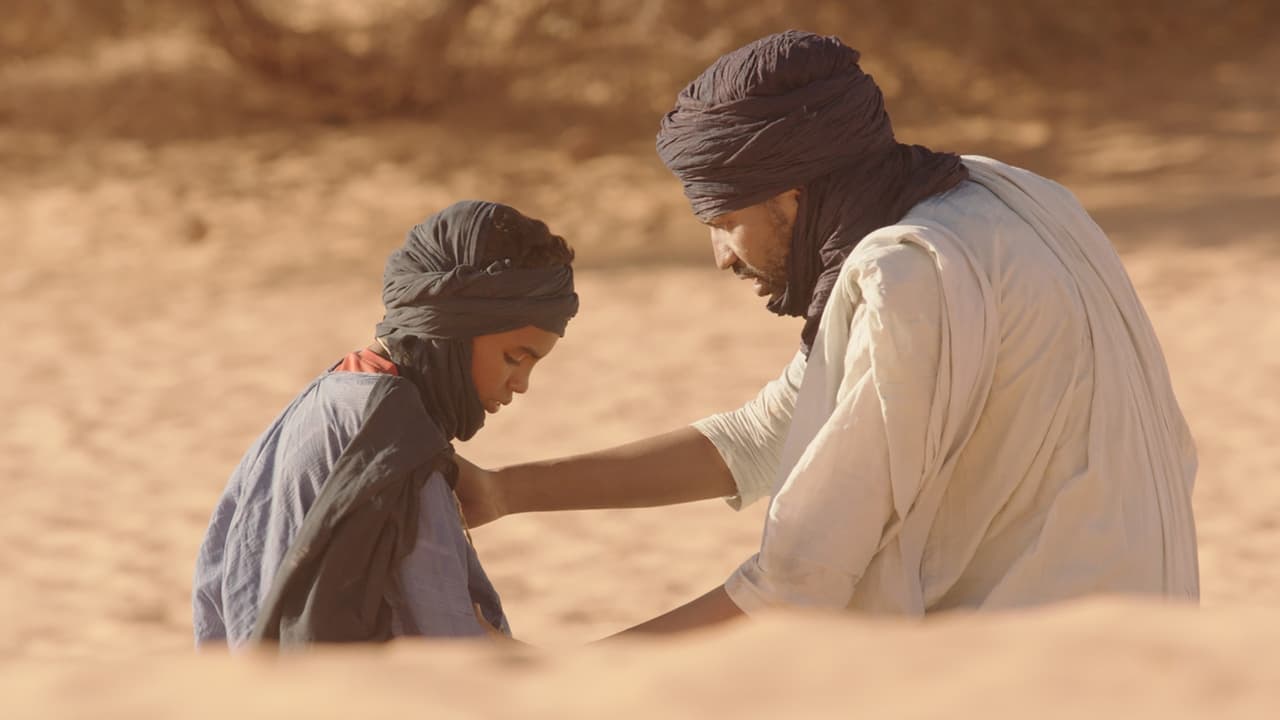

Since hearing about it during Oscar season a few years ago, Timbuktu has been a film I've been interested to see,but unable to due to not being able to find a DVD of it. Looking to see what was about to be removed from Netflix UK,I was surprised to find the title! I got set to at last see this Oscar nom title.The plot:Entering Timbuktu,a group of ISIS fighters declare that they are taking over the land,and that everyone must follow their version of Sharia law. Driving round the villages,ISIS force the public to follow the Sharia law,from not playing with a football to no one being allowed to be in a room with a person of the other sex. As ISIS start controlling every aspect in the running of the area,local residence begin trying to speak to the fighters contradictions.View on the film:Remarkably being the first film shot in Mauritania, (standing in for Timbuktu) co-writer/(with Kessen Tall) director Abderrahmane Sissako & cinematographer Sofian El Fani draws lines in the sand with a remarkable poetic quality,from shimmering wide shots looking across the divide of the town via the river,to haunting shots of ISIS fighters standing on roofs to locate people play music illegally. Carefully using Amin Bouhafa's gentle score to give an unsettling calm, Sissako superbly follows the daily battle/grind the residences have with long takes which have a documentary grit.Partly based on the killing of a couple in Aguelhok (northern Mali) by Islamist group Ansar Dine,the screenplay by Sissako and Tall brilliantly examines every area of Timbuktu affected by ISIS's arrival with multiple threads following individuals allowing for a full picture of the horror to emerge. Following a very important current issue,the writers give the dialogue an excellent balance between an almost documentary feel and a sharp poetic quality unveiled in the residence exposing the stark contradictions of the extremists with voices of anger,and a compassionate plea for freedom.
... View MoreThere's a lot of restraint and subtlety in director Abderrahmane Sissako's tragic delineation of what it's like to live under an ISIS takeover of a Muslim community. And there's a beautiful artistry in the way he shows the barbarism of Sharia law so horrifically played out while the subjugation of women is made clear. (Actually the women in the movie stand strong against the subjugation.) Thus the evil of the "jihadists" (ISIS is never named but a black flag is flown) is contrasted with the normal lives of Muslim people.Sissako, who also wrote the script, is careful to make this distinction—a distinction that a good part of the world is currently working on. It is not Muslims who are bad; it is the extremists. Yet I could not help but think as I watched this with the incessant talk of God will's, etc., that maybe, just maybe, the tribalism of religion itself is at fault. How horrible it is to live with the constant thought and expression that it is all God's doing (with a little help from the forces of evil), and that we are just pawns in some absurd game played by a nearly omnipotent power that can send you to heaven or hell based on the very behaviors built into your psyche.Well, such would apply to most other religions as well I suppose. So an indictment of Islam is not appropriate. Nonetheless the intense religious climate of the movie was for me almost tyrannical. I felt so sad for all the poor ignorant people and again was reminded of the saying "willful ignorance is the only sin" and again told myself that the only way out of the morass of the Middle East is education leading to enlightenment.The film is in Arabic, French and a bit of English with English subtitles. A lot of what is said is not translated into the subtitles, but little is lost in the comprehension. There are scenes of great beauty contrasted with ugly violence. Beautiful music is played and sung, and there is a soccer game played without a ball. Such is the absurdity of life under the jihadists, who are really just thugs using a distorted vision of Islam in order to justify their crimes.--Dennis Littrell, author of "Understanding Religion and Ourselves"
... View MoreIt is a shame that it took me this long to finally seek this film out, I guess when I wanted to watch it back when it was nominated for the Oscar it wasn't as readily available and I just kept waiting more and more. It's a powerful film, filled with ugliness and the disruption of a particular society and a group of people and how they live, but it's also a pretty visually stunning film. The cinematography here is really strong, it resembles a poem or visual story that needs to be seen to be experienced. The drama isn't ever over the top or broad, and instead just harshly realistic. The screenplay really keeps an eye out for the characterization that makes the whole thing work as well as it does.
... View MoreIslamic jihadists have taken over Timbuktu and the surrounding area. They have forbidden music, dancing, cigarettes, football and many other things. Women are ordered to wear gloves and socks in public. Nomadic cattle herder Kidane lives with his wife Satima, daughter Toya, and son Issan. Many of his neighbors have left. Issan leads the family herd to the river. His favorite cow gets tangled in the fisherman's net. The fisherman kills it. Issan goes home crying. Kidane without all the facts go to confront the fisherman and kills him after a heated exchange. Kidane is brought to the court. The jihadists are not from the area and language difference is a constant barrier. The jihadi commander hides his own infractions while using religion to justify his orders.If anything, this movie is not hard enough on the Jihadists. A lot of the movie is played for sly humor. The most obvious one is the people playing football without the ball while the Jihadists are not there. It is a slightly different way to poke fun at religious rule. Kidane does pose a problem. He is very much in the wrong in the argument. What he does is classified as homicide in almost everywhere. So the religious court doesn't come off as being unreasonable. Kidane needs to be innocent for the audience to see the court as being dictatorial and inherently unfair.
... View More